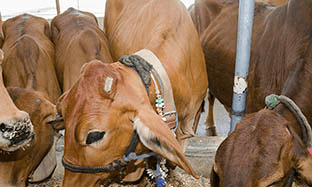.jpg)
Worm bronchitis, a parasitic and respiratory disease in cattle
Worm bronchitis is a respiratory disease in cattle caused by a parasite called Dictyocaulus viviparus. It is a strongle that mainly lives in the airways of cattle. These worms, which are 3-8 cm long, cause significant damage to the lung tissue and obstruct the airways. The first symptoms observed are therefore respiratory disorders and coughing. These signs may be associated with fever, a decrease in food intake, and a decline in economic performance (milk production and growth). The evolution of the disease can lead to severe respiratory distress and death of the animal. Bronchitis lesions caused by worms do not disappear immediately during antiparasitic treatments: the animals can continue to cough long after deworming.
In the typical disease, the symptoms are pronounced towards the end of June / beginning of July, the time necessary for the realization of 2 to 3 parasitic cycles after moving cattle to the pasture. This is also why we talk about summer cough. But today, we observe cases of worm bronchitis from spring, especially if the winter has been mild, and until the end of autumn in case of massive contamination.
In case of infestation, careful management should be considered, to avoid massive contamination of the plots. Parcel rotation will help maintain a low parasite load. Contrary to what is observed for digestive strongyles, the establishment of immunity against pulmonary strangles is rapid but fleeting. Immunity is therefore only transient and recurrence of verminous bronchitis is frequent, which requires strong vigilance. Do not hesitate to ask your vet for advice.

Cattle parasites: What are the peculiarities of external and internal parasites?

